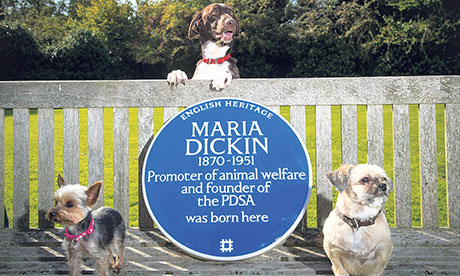Hackney animal rights campaigner Maria Dickin honoured with blue plaque

Unsung hero: plaque of animal ‘NHS’ founder Maria Dickin. Photograph: English Heritage, PDSA
Maria Dickin, the pioneer of free treatment for sick animals whose owners could not afford to pay for it, has been honoured with an English Heritage blue plaque on the Hackney house in which she was born.
Dickin founded the People’s Dispensary for Sick Animals (PDSA).
A blue plaque celebrating her achievements has been installed at 41 Cassland Road (formerly 1 Farringdon Terrace) in Hackney, Dickin’s birthplace and her home for the first two or three years of her life.
The daughter of a Wesleyan minister, Maria Dickin’s concern for the plight of animals began when she visited the poor in London’s East End.
The widespread incidence of unattended sick and injured domestic and work animals made her “indescribably miserable”.
She also recognised that “to many thousands of poor people an animal is essential”, highlighting working animals and making the point that many “would have their poverty-stricken homes overrun with vermin if they did not keep a cat.”
She opened her first clinic in 1917 in a cellar in Whitechapel after a local clergyman gave her use of a basement in the area.
Dickin has until recently been an unsung hero for animal rights.
When she founded the PDSA she took a critical view of vets, and in 1931 she blasted them in a letter, writing:
“If you are so concerned about the proper treatment of Sick Animals of the Poor, open your own dispensaries; open them everywhere for there are vast factory, mining, manufacturing and dockland areas where nothing at all exists to help the Sick Animal…Live among it as we do… Do the same work we are doing. Instead of spending your energy and time in hindering us, spend it in dealing with this mass
of misery.”
Afterwards she compounded her fame by creating a record-breaking 10-tonne Christmas pudding in the Albert Hall as part of the PDSA’s seasonal bazaar.
Historian and vet Dr Andrew Gardiner, who recently wrote a paper praising Dickin’s career, highlighted the fact she directly confronted the veterinary profession of the time and radically improved the fortunes of animals whose owners struggled to afford vets’ fees.
Gardiner says he admires the campaigner’s drive and tenacity: “Maria Dickin set up a network of animal clinics across the country for those unable to afford veterinary fees.
“She was resourceful, fearless and determined in her campaign to ensure that poor people’s animals received medical treatment.”
Today, the PDSA is a modern, successful animal treatment charity operating through a large network of well-equipped hospitals and clinics and occupies a central position in British veterinary medicine.”
Gill Hubbard, the PDSA’s archivist, says the organisation is “incredibly proud” that Dickin’s birthplace is being commemorated.
“The time she spent here laid the foundations for the life that she devoted to helping both animals and their owners,” Hubbard says.
The archivist also emphasises Dickin’s groundbreaking leadership role: “At a time when women weren’t allowed to vote Maria did not let anyone stop her from providing a service needed by so many animals and their owners.”
